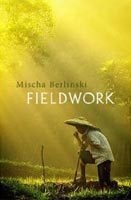 If The Creator’s Map demonstrated the expat writer’s pitfall—the risk of going away to another country, only to come back with a story overladen with guidebook trivia—in Fieldwork, Mischa Berlinksi makes a better job of it. There’s no leaden trivia here, but rather a lively and engrossing tale about friction between anthropologists and missionaries in Thailand.
If The Creator’s Map demonstrated the expat writer’s pitfall—the risk of going away to another country, only to come back with a story overladen with guidebook trivia—in Fieldwork, Mischa Berlinksi makes a better job of it. There’s no leaden trivia here, but rather a lively and engrossing tale about friction between anthropologists and missionaries in Thailand.
It’s held together by the mystery surrounding Martiya van der Leun, whose journey to Thailand began with the intention of studying a remote tribe, but led to her being incarcerated in a Thai jail for murder.
When the novel’s narrator—an American freelance writer living in Thailand with his girlfriend—first hears Martiya’s story, he’s intrigued and decides to write something about it. To this end he begins to pull together the stories surrounding Martiya’s past; he meets and interviews some of her anthropologist colleagues, and later spends time with the missionary Walker family, with whom Martiya’s life became entangled during her stay with the Dyalo tribe. The relationships between the (fictional) Dyalo tribe, the anthropolgists, the missionaries, and later the journalist are rich material and for the most part well-handled.
Berlinski is an able writer and has done his homework; Somerset Maugham is an obvious influence, not just because of the setting, but also from Berlinski’s interest in the interplay between the characters, and his curiosity about what drives them and what they want. He wears his influences on his sleeve, though, as do many debut novelists: Maugham is name-checked at least once, and Norman Lewis is actually quoted in a witty early passage in which the narrator compares the travel writer’s impressions of Chiang Mai to his own.
There’s also a nice eye for detail in the minor characters, for example in this passage where the narrator describes one of his girlfriend’s colleagues at the school where she’s teaching:
[…] and the American from Vermont with a shaggy red beard who came to Thailand after it was discovered that his doctorate in sociology had been the product of plagiarism. He taught the kindergarten by means of a formal lecture, as if in memory of lost glory. He sat his class down, and explained briskly the history of the alphabet since the days of the Phoenicians. The kids sat in patient rows with big eyes, and understood nothing at all, until someone started to fidget and someone else started to cry.
However, where Berlinski’s easy, flowing prose avoids Calderón’s guidebook pedantry, he does flirt with the pointless postmodernism that lamed David Benioff’s City of Thieves. There really is no need for Mischa Berlinski’s narrator to be called Mischa Berlinski. It’s distracting, and actually prevents the reader from building a full, autonomous image of the narrator, who never quite comes to life; his identity never quite asserts itself, and his chatty asides feel out of place. Maybe that’s why the scenes in which he encounters the family of missionaries, with their strong convictions and overbearing personalities, reminded me slightly of Louis Theroux’s documentaries.
I really don’t understand this current trend for hobbling narrators’ characters by weighing them down with the author’s own name. Imagine if The Great Gatsby had been narrated not by “Nick Carraway” but instead by “F. Scott Fitzgerald”; it would have kicked the legs right out from under the story. Even Lawrence Durrell, who had no fear of flirting with metafiction, restricted himself to sharing initials with the narrator of The Alexandria Quartet. If Berlinski partly gets away with it, that’s only because his narrator is rarely named at all, giving the reader a chance to forget as they plough on through the otherwise rich prose. (Fortunately, the intrusive and unnecessary footnotes are equally sparse.)
But disregard those details, and Mischa Berlinski’s Fieldwork is an excellent book, and probably one of the most interesting debut novels I’ve read this year. It was published last year in the USA, where it was shortlisted for the US National Book Award, and has just been published in the UK by Atlantic Books.













August 19th, 2008 at 2:15 pm
What about Philip Roth? Do you hate him too? ;-)
August 19th, 2008 at 2:19 pm
I can’t remember, which books was he being “Philip Roth” in, as opposed to say Nathan Zuckerman? The Counterlife?
It’s been a while since I’ve read any Roth, so it’s all blurred together into one amorphous mass. But I don’t remember particularly liking The Counterlife. I keep meaning to reread the Human Stain and American Pastoral, though. And maybe some of the early ones…
September 14th, 2008 at 5:24 pm
The Counterlife was a Zuckerman book. I am a big fan of the Zuckerman Bound series (The Ghost Writer, Zuckerman Unbound, The Anatomy Lesson and The Prague Orgy).
The ‘Roth’ books include The Facts, Operation Shylock, The Plot Against America and Patrimony. I’ve just read the last, and it’s actually a straight memoir, and absolutely magnificent.
I say all this as someone who used to hate Roth, or at least hated stuff like Sabbath’s Theater and Deception (another Roth book). Then something just clicked, I think with American Pastoral (a Zuckerman book, if we’re still playing this game, along with its loose trilogy-mates I Married a Communist and The Human Stain. And we haven’t even mentioned the David Kepesh series…
September 14th, 2008 at 11:18 pm
Zuckerman Bound was my introduction to Roth, and I remember enjoying those. Then I think I went on to the American trilogy, of which I enjoyed American Pastoral and The Human Stain but didn’t think so much of I Married a Communist. Then I started filling in the gaps. Deception bored me, but I enjoyed Goodbye Columbus and When She Was Good. I don’t remember much about Portnoy’s Complaint except the last line, and hardly anything about The Breast, The Professor of Desire, The Dying Animal, My Life as a Man, The Facts, Reading Myself and Others, Shop Talk, Operation Shylock, The Counterlife, or Patrimony. But I do remember being disappointed by The Plot Against America…
…and just looking at the sheer size of that list, I suddenly understand why I decided I needed to take a break from Roth, and why I’ve forgotten more than I remember of his work!